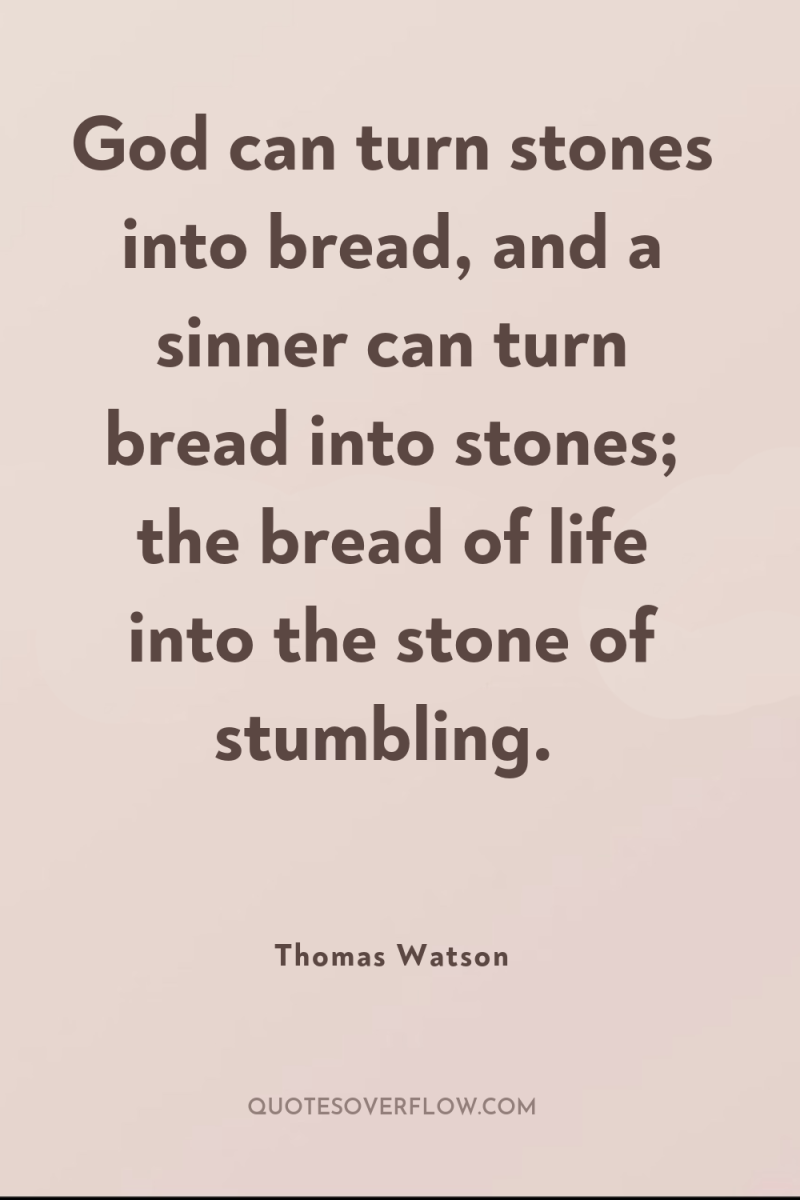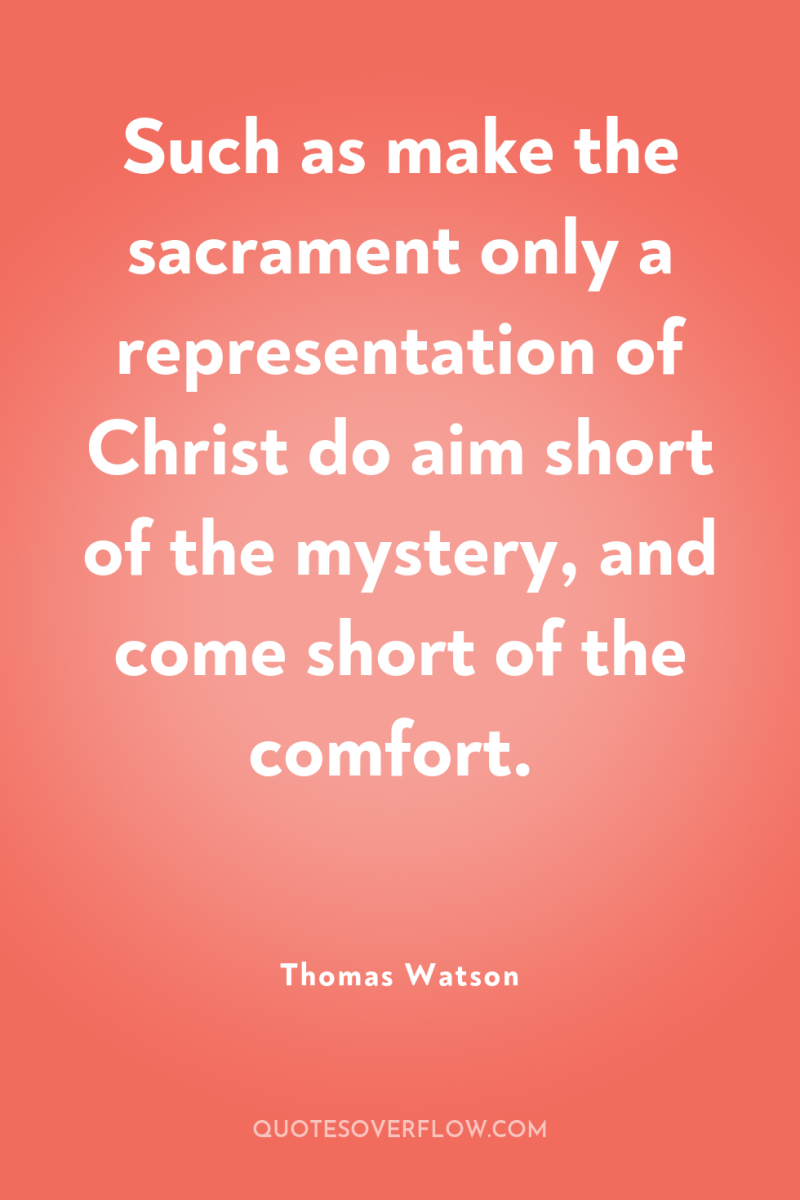1
When exactly did this all change, and what were the social and theological factors that led to the change? The answer seems to be in the second century and: (1) because of the consolidation of ecclesial power in the hands of monarchial bishops and others; (2) in response to the rise of heretical movements such as the Gnostics; (3) in regard to the social context of the Lord’s Supper, namely, the agape, or thanksgiving, meal, due to the rise to prominence of asceticism in the church; and (4) because the increasingly Gentile majority in the church was to change how second-century Christian thinkers would reflect on the meal. Thus, issues of power and purity and even ethnicity were to change the views of the Lord’s Supper and the way it would be practiced.Ben Witherington III

2
God can turn stones into bread, and a sinner can turn bread into stones; the bread of life into the stone of stumbling.Thomas Watson

3
Such as make the sacrament only a representation of Christ do aim short of the mystery, and come short of the comfort.Thomas Watson
4
We should pray that God would enrich his ordinance with his presence; that he would make the sacrament effectual to all those holy ends and purposes for which he hath appointed it; that it may be the feast of our graces, and the funeral of our corruptions; that it may not only be a sign to represent, but an instrument to convey, Christ to us, and a seal to assure us of our heavenly jointure [union].Thomas Watson
5
Forgiveness is local.Matthew C. Harrison
6
Has Christ provided such a blessed banquet for us? He does not nurse us abroad–but feeds us with His own breast–nay, with His own blood! Let us, then, study to respond to this great love of Christ. It is true, we can never parallel His love. Yet let us show ourselves thankful. We can do nothing satisfactory–but we may do something out of gratitude. Christ gave Himself as a sin-offering for us. Let us give ourselves as a thank-offering for Him. If a man redeems another out of debt–will he not be grateful? How deeply do we stand obliged to Christ–who has redeemed us from hell!.Thomas Watson
7
For if we see that the sun, in sending forth its rays upon the earth, to generate, cherish, and invigorate its offspring, in a manner transfuses its substance into it, why should the radiance of the Spirit be less in conveying to us the communion of his flesh and blood? Wherefore the Scripture, when it speaks of our participation with Christ, refers its whole efficacy to the Spirit. Instead of many, one passage will suffice. Paul, in the Epistle to the Romans (Rom. 8:9-11), shows that the only way in which Christ dwells in us is by his Spirit. By this, however, he does not take away that communion of flesh and blood of which we now speak, but shows that it is owing to the Spirit alone that we possess Christ wholly, and have him abiding in us.John Calvin
8
Luther and Calvin believed that both the Roman church on the right and the Zwinglian and Anabaptist churches on the left made the Lord's Supper too much a place WHERE BELIEVERS DID THINGS FOR GOD - either by offering Christ to God (Rome) or by offering their deep devotion to God (the Radical Protestants). The main direction of the Supper, in both of these views, was up.Frederick Dale Bruner
9
The Purpose of the Eucharist lies not in the change of the bread and wine, but in the partaking of Christ, who has become our food, our life, the manifestation of the Church as the body of Christ. This is why the gifts themselves never became in the Orthodox East an object of special reverence, contemplation, and adoration, and likewise an object of special theological 'problematics': how, when, in what manner their change is accomplished.Alexander Schmemann
10
Surely we can only come to understand each other's beliefs by means of direct encounter and open, honest discussion. In the meantime, many free churches invite all believers in Jesus Christ to the Table for the sake of true spiritual unity that transcends intellectual differences of interpretation. Withholding sacramental sharing on the basis of disagreement about the nature of the Lord's Supper seems odd to us. What two people think exactly alike about the act? We are not offended by Catholics' closed Communion, but we find it odd and exclusive. It places intellectual understanding above fellowship among disciples of Jesus Christ.Roger E. Olson
11
We have seen some gatekeeping or fencing-the-table language already beginning to rear its head in this context. One needed to be baptized to take the meal; one needed to repent to take the meal; one needed a bishop or his subordinate to serve the meal. This was to become especially problematic when the church began to suggest that grace was primarily, if not exclusively, available through the hands of the priest and by means of the sacrament. One wonders what Jesus, dining with sinners and tax collectors and then eating his modified Passover meal with disciples whom he knew were going to deny, desert, and betray him, would say about all this. There needs to be a balance between proper teaching so the sacrament is partaken of in a worthy manner and overly zealous policing of the table or clerical control of it.Ben Witherington III
12
Despite the differences in detail and in emphasis in Wesley's exposition of the two sacraments, there is an underlying unity in his sacramental theology. He regarded both sacraments as means whereby God could confer grace according to His promise, but yet insisted, that in order to prevent the means from being mistaken as ends, it was necessary for there to be an appropriation of the grace held out by the faith of the believer. Grace was not conferred IN SPITE OF MAN, but only with his co-operation. So human response was necessary for the efficacy of the sacraments, although man's actions were never thought of as meritorious works. .John R. Parris
13
[The Lord's Supper teaches that] Rituals are good, and they are instituted and used by God to 'connect' his people with him. We learn through ritual that the church is not just made up of individuals, but is a corporate body. It is not just about personal salvation, but a group of people, the people of God, who are bound to one another and to the faithful through the generations. (page 263)Peter Enns
14
Beginning in 1519 and continuing until the end of his life, Luther expounded a theme that the Sacrament brings and means a fellowship of love and mercy: "This fellowship consists in this, that all the spiritual possessions of Christ and his saints are shared with and become the common property of him who receives this sacrament. Again all sufferings and sins also become common property; and thus love engenders love in return and [mutual love] unites . It is like a city where every citizen shares with all the others the city's name, honor, freedom, trade, customs, usages, help, support, protection, and the like, while at the same time he shares all the dangers of fire and flood, enemies and death, losses taxes and the like. For he who would share in the profits must also share in the costs, and ever recompense love with love ." For Luther, unity with respect to the Sacrament meant both doctrinal agreement and love. When the prerequisite to church fellowship is defined merely (however important! ) in terms of doctrinal fellowship, it can end in a Platonic pursuit of a frigid and rigid mental ideal. Doctrinal unity, true unity in Christ's body and blood, is also a unity of deep love and mercy. If I will not lay down my burden on Christ and the community, or take up the burdens of others who come to the Table, then I should not go to the Sacrament. Close(d) Communion is also a fellowship of love and mercy with my brother and sister in Christ as Luther taught in the previous citation. .Matthew C. Harrison